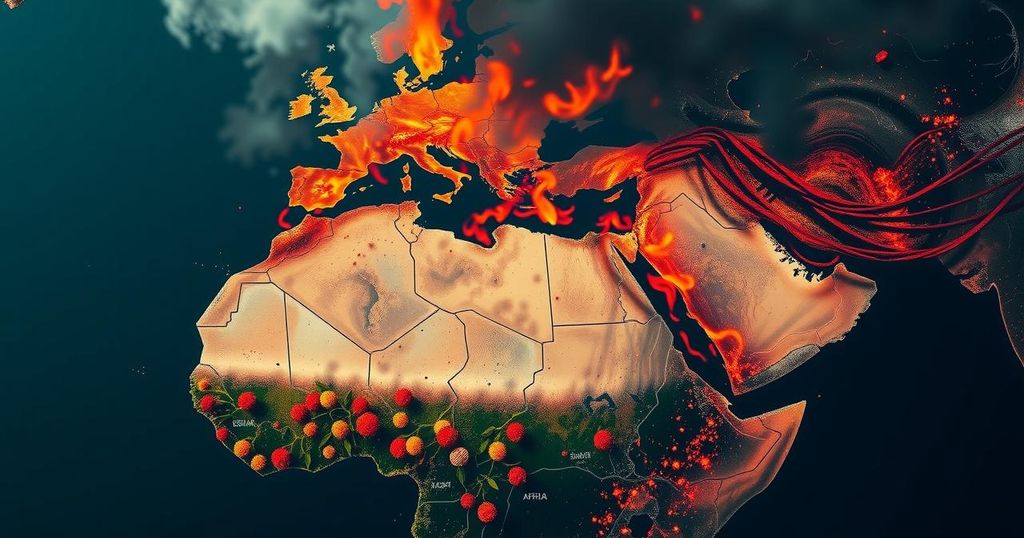This article discusses the escalating tensions in the Horn of Africa, particularly in Ethiopia, where the government’s ambitions and historical grievances have reignited conflicts with neighboring Somalia and attracted the attention of regional powers such as Egypt and Eritrea. It emphasizes the risks of miscalculations leading to broader conflict and the urgent need for diplomatic intervention to mitigate these tensions.
The Horn of Africa is witnessing a resurgence of tensions reminiscent of the critical period preceding the 2020 United States presidential election, when conflicts erupted in Ethiopia. The hostilities between the Ethiopian central government and the Tigray region escalated dramatically during the U.S. elections, culminating in a protracted and devastating conflict that persisted until a ceasefire agreement was reached in 2022, though various unresolved issues, including the return of displaced individuals, linger. Currently, Ethiopia’s Prime Minister Abiy Ahmed finds himself grappling with internal divisions as the coalition originally formed to quell the Tigray conflict continues to fracture. Ongoing unrest in the Amhara and Oromia regions poses additional threats to Ethiopian stability. As the United States becomes engrossed in its own electoral cycle, the deteriorating situation in the Horn of Africa may be inadvertently overlooked. Abiy Ahmed’s ambition to secure access to the Red Sea has rekindled tensions, particularly with Somalia, exacerbating historically contentious relations. His diplomatic overtures towards Somaliland—a self-governing region that aspires for independence—have raised alarms in Somalia. Concurrently, Egypt, wary of the Grand Ethiopian Renaissance Dam’s implications for the Nile River, has sought alliances to counter Ethiopia’s maneuvers, including supplying arms to Somalia. Eritrea’s involvement in the negotiations further complicates the regional landscape, as it historically benefits from fostering instability among its neighbors. Superpower interests are also at play, with Turkey deepening its ties with Somalia and the United Arab Emirates maintaining close connections with the Ethiopian government. The intricate web of influences and historical animosities elevates the potential for miscalculation, endangering regional peace and stability, which would consequently impact global maritime commerce and drive refugee movements. As Sudan grapples with its own humanitarian crisis, overshadowed by a civil war that remains largely underfunded, and as Somalia’s vulnerabilities offer fertile ground for extremist groups like al-Shabaab, the need for de-escalation is critical. The United States must prioritize diplomatic efforts to mitigate tensions, dissuade proxy conflicts, and avert further humanitarian disasters. Ultimately, the consequences of inaction could reverberate beyond the African continent, affecting global stability and security.
The Horn of Africa has been a region fraught with conflict and political instability, particularly highlighted by the civil unrest in Ethiopia. The 2020 conflict between the Ethiopian government and the Tigray People’s Liberation Front marked a significant turning point, resulting in a humanitarian crisis that prompted a ceasefire agreement in 2022. Despite this agreement, numerous issues, including the return of displaced individuals and the collective dynamics between Ethiopia and neighboring countries, have posed ongoing threats to peace in the region. The situation is further complicated by international interests and interventions from powers like Egypt, Turkey, and the UAE, which can escalate tensions and impact both regional and global security.
In conclusion, the Horn of Africa faces a precarious and escalating situation characterized by renewed tensions over regional access to resources and historical grievances. The fragile peace achieved in Ethiopia remains vulnerable due to internal conflicts and external pressures from neighboring countries and international powers. It is imperative for stakeholders, particularly the United States, to engage actively in diplomatic efforts to de-escalate these tensions to avoid a resurgence of violence that would have far-reaching consequences for African stability and global interests.
Original Source: www.cfr.org






